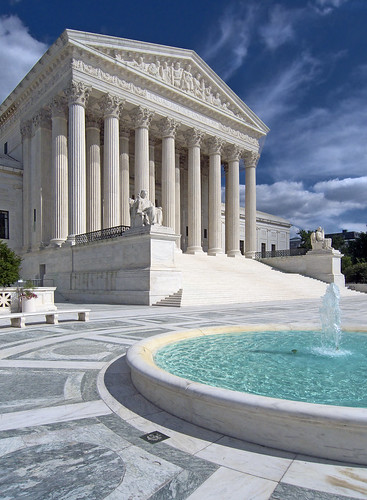
Supreme Court Says States May Disclose Petition Signatories
6/29/2010
 On June 24, the U.S. Supreme Court ruled 8-1 that states may publicly disclose referendum petition signatures. The case, Doe v. Reed, centers on the public's right to know who signed petitions related to Referendum 71, a 2009 attempt to overturn Washington State’s expanded domestic partner law, which gives gay and lesbian couples the same rights as married couples.
On June 24, the U.S. Supreme Court ruled 8-1 that states may publicly disclose referendum petition signatures. The case, Doe v. Reed, centers on the public's right to know who signed petitions related to Referendum 71, a 2009 attempt to overturn Washington State’s expanded domestic partner law, which gives gay and lesbian couples the same rights as married couples.
Summary of Doe v. Reed
The State of Washington argued that the names of petition signatories should be disclosed upon request, as required by the state's Public Records Act. It further argued that such disclosure helps to sort out whether fraudulent signatures were included on petitions to reach the required number of signatories to qualify an initiative or referendum for the ballot.
The plaintiffs, who included several individual citizens and an anti-gay political action committee, argued that a constitutional right to anonymity for petition signatories always exists. They also argued that even if the Court does not recognize a broad constitutional right, it should recognize that a right exists in this particular case due to the harassment and abuse to which the petition signatories could possibly be exposed. Consequently, they argued, if anonymity is not recognized, the public will be discouraged from signing petitions in support of placing referenda and initiatives on the ballot, and this will have an adverse effect on citizens' free speech.
The Court did not find that a constitutional right to anonymity for petition signatories always exists. Rather, it held that the law permits disclosure of petition signatories. "Such disclosure does not, as a general matter, violate the First Amendment," wrote Chief Justice John Roberts in the Court’s majority opinion.
While the Doe v. Reed decision permits states to publicly disclose referendum petition signatures, the Court also held that courts may require anonymity in certain instances. In the particular matter concerning Referendum 71, the Court remanded the case to a lower court to decide if the referendum petition signatures should be publicly disclosed or if anonymity should be granted in this specific case. Plaintiffs' "chances of prevailing appear very slim, as five members of the Court either expressed significant doubts about their claim or expressly rejected it," according to SCOTUSblog.
The Court reasoned that signing a petition is an "expression of a political view – that implicates the First Amendment," noted SCOTUSblog. The Court relied on its precedents to illustrate that most campaign finance disclosure laws are constitutional, but it did allow for requiring anonymity in certain instances.
"The Court held that disclosure of referendum petitions generally survives constitutional scrutiny because it helps to combat fraud and eliminate mistakes (because the public is able to review the signatures) and because it promotes governmental transparency and accountability," noted SCOTUSblog.
Implications of the Decision
The Court noted the important role that disclosure plays in combating fraud and promoting government transparency. "Voters care about such issues, some quite deeply," said the Chief Justice. He also noted that the petitioners did not rebut arguments that most referendum petitions present "only modest burdens."
Sam Reed, Washington's Secretary of State, told NPR that the Court's decision "really is a victory for the people in terms of open government, transparency in government and the people's right to know."
Even though the Court decided the case by an 8-1 majority, the justices were split on important aspects of the case. "While the court was almost unanimous in the decision to favor transparency over privacy, the justices disagreed widely about who should get a privacy exception," according to NPR. This is evidenced by the seven separate opinions issued in the case. Justices Ruth Bader Ginsberg and Anthony Kennedy were the only justices who did not write a separate opinion. Still, advocates for public disclosure view this case as a major victory.
J. Gerald Hebert, Executive Director of the Campaign Legal Center, released a statement praising the decision and using it to encourage Congress to move forward on the DISLOSE Act, the bill developed by Democrats to respond to the Court's decision in Citizens United v. Federal Election Commission. "Members of Congress considering the DISCLOSE Act should be encouraged by today's ruling from the Court, which highlights once again the public's right to know," Hebert said.
Tom Goldstein echoed similar sentiments on SCOTUSblog. "The decision is perhaps most significant for what it means for disclosure provisions under consideration in the pending campaign finance legislation that would respond to the Court’s Citizens United decision," Goldstein said. The DISCLOSE Act passed the House on June 24 by a vote of 219-206 and now heads to the Senate, where it awaits further action.
Daniel Schuman of the Sunlight Foundation also noted that some passages in Doe v. Reed could indicate wider implications for campaign finance-related disclosure. In a blog piece posted on June 25, he speculates that there may be a "ticking time bomb" to be found within the multiple concurring opinions and Justice Clarence Thomas' dissenting opinion that could force the Court to eventually determine just what level of disclosure is permissible under the First Amendment.
In the short-term, Doe v. Reed impacts referendum and initiative petition campaigns nationwide, affecting the 23 states that allow citizens and special interest groups to petition to place measures on the ballot.
Image in teaser by flickr user ken mccown, used under a Creative Commons license


